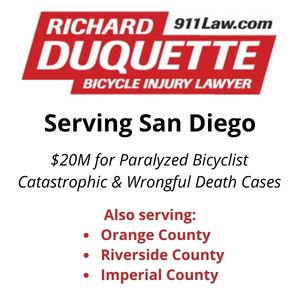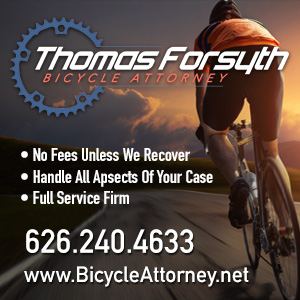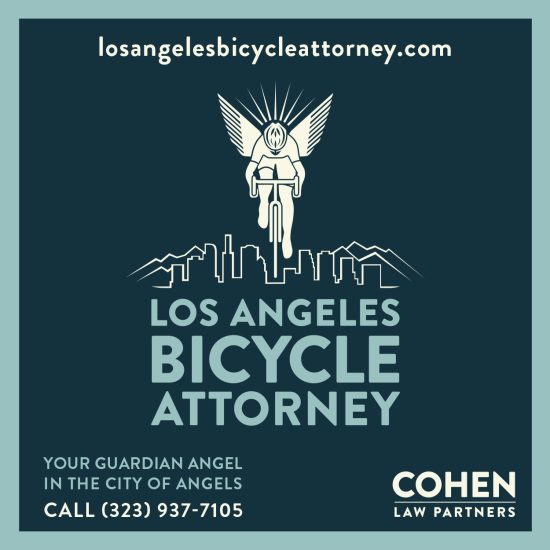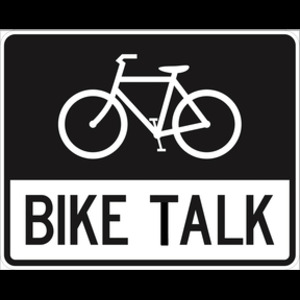Bikes Have Rights™
By James L. Pocrass, Esq.
Pocrass & De Los Reyes LLP
This may well be the most controversial blog post I’ll ever write. It’s likely that many of you are going to hate reading this. Some of you will tell me that what I say here isn’t fair and that I’m blaming the victim.
Be assured, I’ve represented many bicycle riders in bike crashes and I know as well or better than anyone how the system is stacked against them. As to fairness, well, it isn’t fair that I don’t have the same head of hair that I had as a younger man either, but that’s the way it is.
What I’m going to tell you is the hard truth. It’s not fair, but it IS an undeniable, regrettable fact: many people have strong, negative feelings about cyclists. If you are in a bike crash and it goes to trial, the judge and/or jurors will probably not be cyclists.
Though the people on your jury and the judge presiding over your trial have probably encountered hundreds – if not thousands – of law-abiding bicyclists, those aren’t who they remember. They remember the helmetless cyclist who cut them off or rode through a red light and saluted them with a middle finger as they blew by. It’s always that “one” ne’er-do-well who people remember.
The U.S. Bicycling Participation Benchmark Report, commissioned by People for Bikes, reported that though the number of Americans ages 3+ who rode a bicycle last year is larger than had been previously thought, 30% of these cyclists rode 5 days or fewer in 2014.
The chance of getting a cyclist on your jury or a judge is probably even worse when you add the number of seniors who willingly sit on juries. (Think of that the next time you attempt to get out of jury duty or complain about being called for jury duty.)
The result is that the judge and jurors, more than likely, are going to be people who are biased against cyclists. When I am questioning potential jurors in a bicycle case, some of the most common comments I get from people are:
- Bike riders ride recklessly, not stopping at red lights or stop signs.
- Bike riders should ride on the sidewalk and stay out of traffic.
- Bike riders ride too fast on the sidewalk.
- Bike riders ride in car lanes, sometimes side-by-side or as a group, which interferes with traffic.
- Roads are for cars, not bikes.
You know all this. If these things have never been said to your face, you’ve read them in comments on articles and posts on social media.
These are the people who are going to decide your legal case. Their inclination is going to be to blame YOU – the cyclist – for your own “accident.” Furthermore, insurance adjustors and defense attorneys know this, and they are going to cater to this bias.
It would be nice if more people understood the rules of the road. “Fair” doesn’t enter into the equation. In a trial, we have to deal with the hand we’ve been dealt, and in most bike crash trials, it’s contending with the prejudice against our cyclist client.
To be successful in trial it is critical for your trial lawyer to understand how people perceive you. As a trial lawyer, I have numerous strategies I utilize to attempt either to overcome this bias or to focus the jurors on the person the cyclist is, not his/her activity. I want the juror to see the cyclist as a person who has more in common with the jurors than s/he has different. An experienced trial lawyer utilizes specific strategies in every part of the trial, from jury selection at the beginning of the trial to how jury instructions are crafted near the end of the trial, and everything in-between.
I believe we can change these preconceptions, but it isn’t easy, and it isn’t going to happen tomorrow, next month, or even next year.
As a cyclist – whether you ride for recreation or as a commuter – you can be part of the solution. Here are some suggestions:
- Join the Los Angeles County Bicycle Coalition and your local bicycle advocacy organization. Even better, get involved. These people are on the frontline of change. At the very least, sign up for the LACBC’s e-newsletter (no membership required) and join these advocacy organizations’ Facebook pages. (And in a shameful plug, “friend” the FB Pocrass & De Los Reyes Bicycle Law page, too.)
- I suggested above that you join your local advocacy organization. Many of these are chapters of LACBC, all of them work together. Almost all cities have such organizations, including Claremont, Pomona, the Eastside, Santa Monica, Beverly Hills, Santa Clarita, and many more.
- Join the California Bicycle Coalition, our state-wide organization that is instrumental in lobbying for biking conditions and laws for California cyclists.
- Get involved with SAFE (Streets are for Everyone). The nonprofit advocates for changes in the law to make streets safe for bicyclists, motorcyclists, pedestrians, skateboarders, and everyone else.
- Know and follow the Rules of the Road. The LACBC has a wonderful wallet-sized brochure that explains what these are. They are available at every event attended by the LACBC. The organization also is offering FREE bicycle safety classes through the end of September throughout the Southland. Don’t be that one cyclist who will be burned into the brain of those who come in contact with him/her for his/her bad behavior.
- Cyclists over the age of 18 are not required by law to wear a helmet when they ride. We strongly urge you to wear one, regardless of your age. The obvious reason for wearing a helmet is that it very likely increases your chances of surviving or limiting brain injury should you crash. A less obvious reason is that not wearing one adds to the jurors’ and judge’s biases that you SHOULD HAVE BEEN wearing a helmet and if you had been wearing one, it would have protected you so your injuries “are your own fault.” (Don’t kill the messenger, please. I said I was going to talk reality here.)
- Think before you post on social media. Specifically, insurance companies and defense attorneys troll your social media accounts to see what can be used against you. What you write on social media will come back if you’re ever a plaintiff in a jury trial. Generally, furious posts filled with expletives (I understand the urge, believe me), reinforce non-cyclists’ attitudes about the “arrogance” of cyclists.
- Educate the non-cyclists you know. Back up your arguments with facts and statistics. Try to be calm and rational in the discussion, but the one-on-one discussions are the best way to change perceptions. Remember, no one goes out to kill someone with their car (okay, almost no one), but most drivers are angry because they’re scared. No one taught them how to share the road. No one taught them how to drive sharing the road with a cyclist. You can say that’s not your problem, but the truth is, it’s everybody’s problem.
Often when I read bikinginla.com and see the slap on the wrist so many drivers get for hitting cyclists, I am frustrated by the slowness of the process to eliminate cyclist bias. But it’s coming, and by working together, I believe we can make it happen.
For more than 30 years, Jim Pocrass has represented people who were seriously injured, or families who lost a loved one in a wrongful death, due to the carelessness or negligence of another. Jim is repeatedly named to Best Lawyers of America and to Southern California Super Lawyers for the outstanding results he consistently achieves for his clients. Having represented hundreds of cyclists during his career, and Jim’s own interest in cycling, have resulted in him becoming a bicycle advocate. He is a board member of the Los Angeles County Bicycle Coalition. For a free, no-obligation consultation, contact Jim Pocrass at 310.550.9050 or at info@pocrass.com or visit www.pocrass.com.








I know this will be a bit of a stretch, but since the “other side” pre-emptively blocks cyclists from most juries dealing with bike issues, can a pre-emptive challenge remove all licensed drivers from the same pool?
Great suggestion. Doubt it would work, but I’d love to see someone try.
I like the way you think (smile), but in reality that wouldn’t work. You typically get a limited number of preemptive challenges, 3 is usual, but it can vary by the judge’s ruling. You have to be very selective about how you use those challenges. In other words, is this guy/gal the most horrible or will there be someone worse down the road?
Thanks to Mr. Pocrass for the sober reminders about cyclists’ status in our society.
There were several points in the article explaining how cyclists can be part of the solution. I wonder if video from a good quality camera (GoPro, etc.) can also be useful in court.
One of the main reason I bought a video camera was to protect myself but all to often I’m catching morons like this https://www.youtube.com/watch?v=cpWTRwb9Cmk
At least the second rider used the crosswalk, right?
I got my cam for the same reason, after I was hit on purpose by a road raging driver who swore I fell over while running the stop sign I was stopped at. If something like that ever happens again, I’ll have proof of what really happened.
Here’s a guy who actually stopped https://www.youtube.com/watch?v=49nLDDtl66w and just to be fare https://www.youtube.com/watch?v=BJRVE9SMyLY
I always recommend that cyclists ride with a video camera system, such as GoPro. It takes a lot of the he said/she said out of the equation should there be a bike crash. Glad you got one. Just remember to use it.
mwandaw,
I wanted to add another comment about your comment. A system such as GoPro also can be invaluable to keep you out of court and to encourage the insurance company to come to a fair settlement.
If there is video that they accept as clearly showing their client as liable; if they believe the damages you have suffered; and if they know that your bike attorney WILL take them to court and has a record of winning, the insurance company may very well settle, saving you money and time.
So that’s another benefit of having video of what happened in a collision.
Jim – thanks for the information!
Great post, Jim!
Thanks, Josh.
Very informative. I hope I never need your services but as an every day commuter I know I just might. I went through this stuff when I used to ride a motorcycle and thank god they settled because we were preparing for a hostile jury. I definitely chalk that up to having a good lawyer with experience relevant to motorcycles.
Thanks.
To the list of advocacy groups I’ll add any city or local governmental oversight group of commission. Attend the meetings of your Bike Ped commission. Signup for the email agendas so you can see what is coming up for discussion. If you don’t go you are not going to be heard. You are enforcing teh status quo. If you have the volunteer to those commissions to help push the boulder.Some one is going to set teh agenda and decide what happens so your part to help cycling.
As a political gadfly once said: “If you don’t like the news go out and make some of your own.”